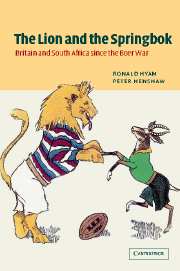Book contents
- Frontmatter
- Contents
- List of illustrations
- List of tables
- Preface
- Acknowledgements
- List of abbreviations
- 1 The uneasy special relationship: dynamics and divergencies
- 2 Breakdown: into war, 1895–1899
- 3 Post-war: the myth of magnanimity, 1905–1907
- 4 African interests and the South Africa Act, 1908–1910
- 5 ‘Greater South Africa’: the struggle for the High Commission Territories, 1910–1961
- 6 The economic dimension: South Africa and the sterling area, 1931–1961
- 7 Britain, the United Nations, and the ‘South African disputes’, 1946–1961
- 8 The political consequences of Seretse Khama and Ruth, 1948–1952
- 9 Containing Afrikanerdom: the geopolitical origins of the Central African Federation, 1948–1953
- 10 Strategy and the transfer of Simon's Town, 1948–1957
- 11 The parting of the ways: the departure of South Africa from the Commonwealth, 1951–1961
- 12 Enfeebled lion? How South Africans viewed Britain, 1945–1961
- 13 Springbok reviled: some British reactions to apartheid, 1948–1994
- Epilogue The relationship restored: the return of the new South Africa to the Commonwealth, 1994
- Select bibliography
- Index
8 - The political consequences of Seretse Khama and Ruth, 1948–1952
Published online by Cambridge University Press: 03 December 2009
- Frontmatter
- Contents
- List of illustrations
- List of tables
- Preface
- Acknowledgements
- List of abbreviations
- 1 The uneasy special relationship: dynamics and divergencies
- 2 Breakdown: into war, 1895–1899
- 3 Post-war: the myth of magnanimity, 1905–1907
- 4 African interests and the South Africa Act, 1908–1910
- 5 ‘Greater South Africa’: the struggle for the High Commission Territories, 1910–1961
- 6 The economic dimension: South Africa and the sterling area, 1931–1961
- 7 Britain, the United Nations, and the ‘South African disputes’, 1946–1961
- 8 The political consequences of Seretse Khama and Ruth, 1948–1952
- 9 Containing Afrikanerdom: the geopolitical origins of the Central African Federation, 1948–1953
- 10 Strategy and the transfer of Simon's Town, 1948–1957
- 11 The parting of the ways: the departure of South Africa from the Commonwealth, 1951–1961
- 12 Enfeebled lion? How South Africans viewed Britain, 1945–1961
- 13 Springbok reviled: some British reactions to apartheid, 1948–1994
- Epilogue The relationship restored: the return of the new South Africa to the Commonwealth, 1994
- Select bibliography
- Index
Summary
Ruth Williams was not a typist. She was apt to be put out when the newspapers called her that. In fact she was a secretary, a confidential clerk, with a firm of Lloyds' underwriters in London. On 30 September 1948, at a register office in Kensington, she married Seretse Khama, heir to the chieftaincy of the Bangwato in the Bechuanaland Protectorate. No-one knew whether the Bangwato would accept a white consort. British newspapers ran features headed ‘Shall typist be a Queen?’ (Sunday Dispatch, 28 November 1948), and ‘This girl can upset the peace of Africa’ (Sunday Express, 10 July 1949). White opinion in South Africa was aghast: the marriage was condemned as ‘distasteful and disturbing’ (Johannesburg Star, 28 June 1949), as ‘striking at the root of white supremacy’ (Natal Witness, 2 July 1949). Ruth's parents opposed the marriage and did not attend the ceremony. Her father, George Williams, was a retired Indian army officer, working as a commercial traveller. Ruth was born in 1923, and brought up in Blackheath and Lewisham. She attended Eltham High School, took polytechnic classes in cookery, and served for four years in the war as a corporal-driver with the WAAF (Women's Auxiliary Air Force). Together with her sister Muriel, she was a churchgoer, keenly interested in the African work of the London Missionary Society (LMS). They were constant visitors to the colonial students' hostel at Nutford Place in Bayswater.
- Type
- Chapter
- Information
- The Lion and the SpringbokBritain and South Africa since the Boer War, pp. 168 - 197Publisher: Cambridge University PressPrint publication year: 2003



